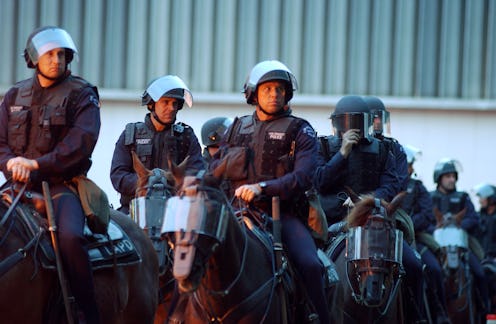The exhaustive ESPN documentary series O.J.: Made In America premiered last Saturday, likely drawing many of the same viewers who were captivated by the FX drama American Crime Story: The People V. O.J. Simpson earlier this year. ESPN's five-part doc covers a lot of ground that American Crime Story only touched on, or referred to tangentially. Racial tension was boiling over in Los Angeles in the early '90s, and many minorities in that city were (and are) distrustful of law enforcement. In American Crime Story, the characters discuss how those sociopolitical realities are affecting O.J. Simpson's trial. Made In America details some of the events that ratcheted up that racial anger and fear, including the death of 15-year-old Latasha Harlins.
In March of 1991, The New York Times ran an item about a convenience store owner named Soon Ja Du being charged for the murder of a young black woman in her shop. According to the 51-year-old store owner, Latasha Harlins was attempting to shoplift. According to the New York Times, Du claimed that Harlins put a bottle of orange juice into her backpack, but Commander Michael Bostic of the LAPD "said a videotape from a security camera showed that the girl had money in her hand and was not stealing." Bostic went on to say that "the tape showed that the teenager had given up after a brief struggle, had left the orange juice on the counter, and was apparently leaving when she was shot." The Los Angeles Times reported that Du threw a stool at Harlins and then shot her once in the back of the head with a .38 caliber pistol.
Du was convicted of manslaughter in November of 1991, according to a separate article in The New York Times, but Superior Court Judge Joyce Karlin (who is white) sentenced the woman to five years of probation, 400 hours of community service, and restitution to the Harlins family for funeral expenses. "No matter what sentence this court imposes, Mrs. Du will be punished every day of her life. She will have to live with this every day for the rest of her life," Karlin said from the bench, according to that same NYT article.
In addition to contributing to the general climate of Los Angeles in the early '90s, the Harlins case has another connection to O.J. Simpson's trial. The Los Angeles Times reported in 1992 that Soon Ja Du petitioned the court for permission to visit relatives in Korea. The judge who heard that request? Lance Ito, who would preside over Simpson's trial in 1995. The LA Times reported that the United States Justice Department intervened, sending a letter to Ito encouraging him to deny Du's petition "pending the completion of a U.S. Justice Department 'inquiry to determine whether any federal statutes were violated.'" The LA Times reported that Du's legal team eventually withdrew the request. The outcome of the inquiry is unknown.
Du's light punishment and the April 1992 acquittal of the Los Angeles Police Department officers caught on tape beating taxi driver Rodney King prompted the infamous Los Angeles riots. According to The New York Times, those riots resulted in 53 deaths and $1 billion in damages, including the looting and destruction of "dozens" of Korean-owned businesses. Harlins' name has since been invoked in popular culture as an example of racism and senseless violence. Anna Deavere Smith wrote and performed a Broadway play about the 1992 riots called Twilight: Los Angeles that included Harlins' story. Tupac Shakur dedicated his song "Keep Ya Head Up" to her memory.
In 2007, the 15th anniversary of the Los Angeles riots was marked by a peace march intended to symbolize the healing that Korean-Americans, African-Americans, and other minority groups had been pursuing. The Los Angeles Daily News reported that only 350 individuals took part in the march. "There is still deep pain," said participant Lee Jung-Hui. "But we all must learn to forgive one another and change the world for the better."
A vigil was held in Los Angeles this March for the 25th anniversary of Latasha Harlins' death. According to The Los Angeles Times, her aunt Denise Harlins mourned the wasted potential of her niece, who had dreamed of becoming a lawyer. "She represents so many that are not here that would have been something to somebody," she said.
